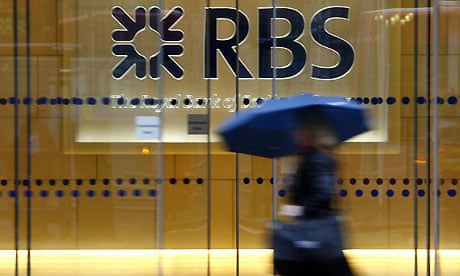Royal Bank of Scotland is preparing to enter talks with regulators to settle Libor-rigging claims, its chief executive said on Friday, as the bailed-out bank prepares to face a major fine for the attempted manipulation of the key interest rate.
As RBS revealed that the payment protection insurance (PPI) scandal was now costing it £1.7bn, Stephen Hester said he would be disappointed if he did not have more news on the scale of the Libor situation by the time the bank reported its full-year results in February.
The bank, just over 80% owned by the taxpayer, does not yet know if the fine it incurs will be larger than the £290m penalty paid by Barclays to the Financial Services Authority and regulators in the United States. Even if the fine is smaller, Hester said it would be a "miserable day in RBS's history".
Hester said the "explosive" reaction to the Barclays fine – which forced the departure of the chief executive Bob Diamond – may be a factor considered by regulators. "We are up for settling with all and every one as soon as they are ready," he said.
While preparing the ground for a large Libor fine, RBS also bore the cost of the PPI mis-selling scandal, now regarded as the costliest mis-selling scandal in the UK, taking an extra £400m provision. Finance director Bruce van Saun described the total £1.7bn charge as a "best guesstimate" and said the bank had been "guilty of underestimating the response rate" from customers.
Asked if any bankers had been disciplined for the PPI scandal, Hester said all the senior managers had left but indicated there had not been a clawback of bonuses because that provision was not included in contracts until 2009. "The industry has to take its medicine on PPI," said Hester, who has already axed bonuses linked to sales targets for branch staff.
The PPI provision contributed to a £1.2bn loss in the third quarter versus a £2bn profit a year ago. For the nine-month period the bank reported a £2.7bn loss, against £1.2bn profit a year ago. An accounting rule requiring RBS to take account of the cost of buying back its debt also fed into the loss for the quarter, as did a £50m charge for the summer's IT meltdown, taking the total charge to £175m.
Hester, who was parachuted in to run the bank in October 2008 when Fred Goodwin was ousted, said the bank's restructuring plan would be completed by the next election but any attempt by the government to cut its stake was likely to depend on economic growth and the share price.
"Plausibly, we can be ready. Whether our share price is ready and the government is ready is not in our control," said Hester. The shares closed 2% lower at 280p, well below the 500p average at which the government's near-80% stake was bought, a loss of about £18bn.
"We have already made much progress, though clearly not enough, and our reputation will take time to recover from past events which are still being accounted for," said Hester.
The bank, which has axed 9,000 staff in the past 12 months and 37,000 since the 2008 crisis, is being forced to sell off parts of its business to meet EU rules linked to the £45bn taxpayer bailout.
RBS has sold a third of the Direct Line insurance business but has run into difficulty with the sale of 316 branches to Santander, which pulled out last month. Hester said RBS was unlikely to ask the EU to reverse its decision.
The sales process has been resumed, and the branches could be floated off under the brand name Williams & Glyn, first created in the early 1970s but disused from 1985.
RBS is also under pressure to consider the sale of its Citizens operation in the US but Hester indicated that the bank wanted to have a geographic spread of businesses.
